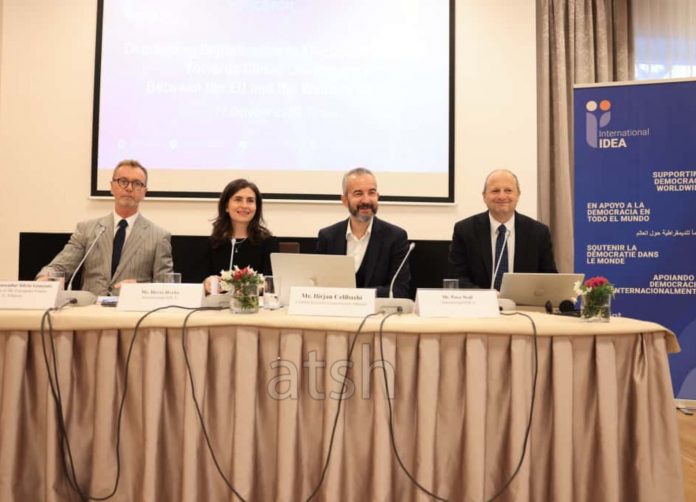In Albania, political parties are preparing to establish a special parliamentary commission to address the recommendations of the OSCE/ODIHR for electoral reform.
The commission is expected to address important issues such as the depoliticization of commissioners, the swift announcement of results after the elections, and other points recommended in the reports of international observers.
The European Union Ambassador in Tirana, Silvio Gonzato, stated that the EU welcomes the commitment of political parties to establish a joint commission for Electoral Reform.
During a conference in Tirana on the theme “Oversight of Digitalization in Electoral Processes: Towards Convergence between the EU and the Western Balkans,” Gonzato encouraged the parties to have an inclusive process based on facts and led by the OSCE-ODIHR and the recommendations of the Venice Commission.
According to Gonzato, initiatives in this direction aim to assess the overall environment, not just the legal framework, that could impact the playing field for elections, which according to the OSCE-ODIHR has been lacking. He emphasized that the initiative also reflects the understanding that there is a need to confront the challenges of the past and those of the future.
“We in the European Union welcome all these steps and encourage you to have an inclusive process, based on facts, led by the OSCE-ODIHR and the recommendations of the Venice Commission. Therefore, the recommendations of both parties, the OSCE and the Venice Commission,” emphasized Gonzato.
Gonzato stated that “the CEC has taken important steps for a post-election analysis with proposals to enhance transparency and efficiency in future electoral processes. We fully support these proposals.”
Furthermore, Gonzato addressed the use of technology as a tool for modernizing electoral systems, educating voters, and training infrastructures.
“The EU and the Council of Europe are proud to continue the partnership through a new support project for electoral cycles in Albania, of course with the CEC as the main beneficiary,” said Gonzato.
According to Gonzato, this project aims to improve the capacities of the CEC, empower them, and promote the inclusive participation of civil society and the media while maintaining digital transparency.
Electoral and digital reform are part of the commitments that Albania has made to become a member state, part of chapter group 1 – Fundamental Issues, and contribute directly to the roadmap for the functioning of democratic institutions, which emphasize the importance of elections, transparency, accountability, and citizen participation, which are the foundations of the EU.
According to him, digital technologies are placing this link of democracy before challenges, so Brussels will assist Albania in reflecting on new risks in legislation.
“Digitalization offers great opportunities for inclusive participation, transparency, but also brings vulnerability to manipulation that comes from Artificial Intelligence, for disinformation and misuse of data,” added the ambassador.
“The European Union has created one of the most inclusive digital frameworks, including the Digital Services Act, the Freedom of Speech and Media Act, the Artificial Intelligence Act, and soon we will have a regulation for transparency and political advertising. These instruments are not created just for market regulation, but are created to protect citizens, ensure competition, and maintain trust in institutions, which is essential for electoral processes,” said the European ambassador. (October 21)
 go to the original language article
go to the original language article
